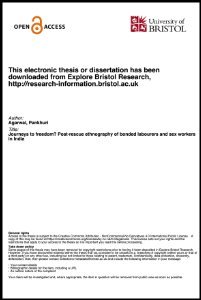By Pankhuri Agarwal.
Working with a simplistic notion of release from bondage as “freedom”, mainstream anti-trafficking activists focus on rescue. They argue that victims of trafficking are “free” once removed from their employers. Critics contest this approach and argue that significantly less attention is paid to the role of the state and the NGOs in producing conditions due to which people remain vulnerable. This research lends empirical support to this critical position through a multi-sited ethnography of informal migrant workers, sex workers, and law enforcement officers, traversing through courtrooms, police stations, district welfare offices, worksites, shelter homes, and offices of NGOs, in New Delhi, India. It corroborates that the authority of law is compromised ‘on ground’ and is actively negotiated within the legal space of anti-trafficking efforts. Instead of being instantly transported to “freedom”, the workers end up in protracted legal proceedings, ranging two to thirty-seven years, to seek justice and rights. Their rights are neglected due to a Kafkaesque bureaucracy. Their mobility is restricted due to improper documentation. Their suffering is intensified through an evasive legal system. The result – arbitrary, unjust legal outcomes after an endless wait and dependence on intermediaries. In fact, their journey through the system, with cost and time overruns, has no direct or precise chronology, and often moves in a circle rather than reaching an end. The workers resemble the class of people that Denise Ferreira da Silva (2009) describes as “nobodies”. They continue to struggle to achieve the rights and recognition that would allow them to escape this status. The combination of empirical data, doctrinal analysis, and socio-legal theory in this research provide an insight on the harm and limits of the anti-trafficking discourse with reference to India.
Bristol, UK: University of Bristol, 2021. 233p.


